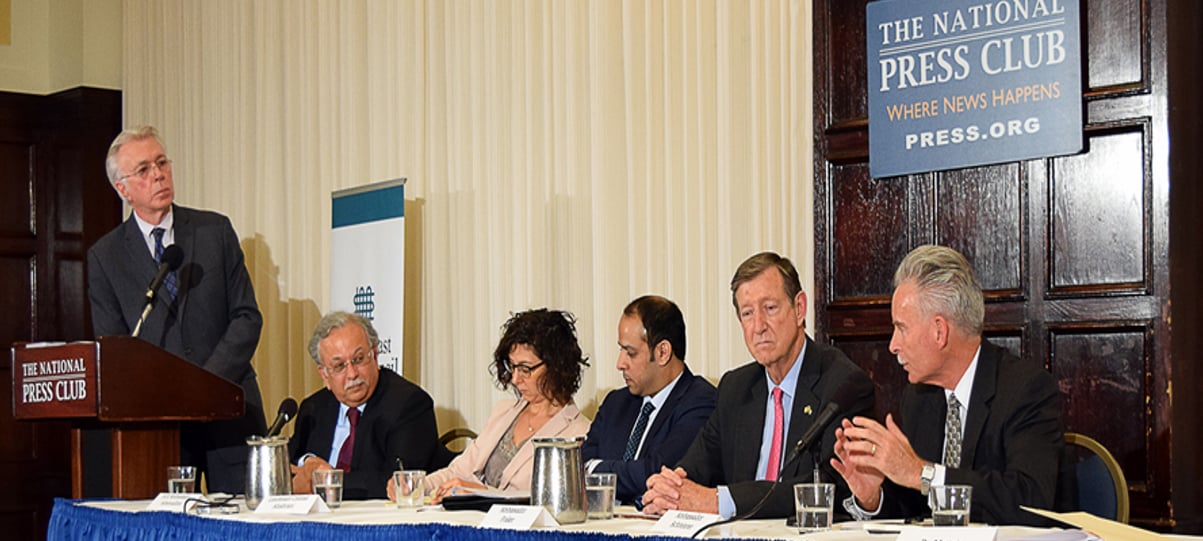
The Middle East Policy Council (Washington, D.C.) forum with Ambassador Almouoallimi (second from left) and Lt Col. Alzahrani (third from right).
Many Americans think of Saudi Arabia as the world’s rich oil producer, the cradle of Islam, and the home of most of the September 11th hijackers, more than as a counterterrorism ally.
During his presidential campaign, Trump called Saudi prince and magnate Alwaleed bin Talal “dopey” and accused him of trying to control American politicians “with daddy’s money.”
Trump blamed the Saudis for the September 11th attacks, and said the Kingdom does not pay for the vital support it gets from the United States. But now, with a major arms deal in the in works and Trump’s imminent arrival, Saudi Arabia is promoting its counterterror efforts.
Saudi Arabia’s ambassador to the United Nations, Abdullah Almouallimi, joined by the Ministry of Interior’s Lt. Col. Khalid Alzahrani, outlined in Washington the Kingdom’s approaches to terrorism.
They positioned Saudi Arabia as a victim of terrorism, and a critical partner in the global efforts to defeat it. Beginning with the 1979 attack on the Grand Mosque in Mecca, and specifically pointing to the 2004 deadly attack on the U.S. consulate in Jeddah, Alzahrani said that Saudi Arabia had stopped 229 of 335 attempted terrorist attacks inside the country, mostly by suicide belts and bombings.
Efforts to combat terrorism, Almouallimi described, are part of a generation-long struggle. The keys are not military, but the winning of “hearts and minds.”
Changing the school curriculum, eliminating anti-Semitic rhetoric, emphasizing that terror is not dependent on race or religion, and rehabilitating and reintegrating former terrorists are keys to Saudi efforts to address the root causes of terrorism. To support this, Saudi Arabia contributed to the establishment of the United Nations Counter-Terrorism Center in 2011.
In addition to these, Ambassador Almouallimi also emphasized that Saudi Arabia has been a strong partner in the war against Daesh.
Lt. Col. Khalid Alzahrani described Saudi efforts at security, ideology, and finance. It has boosted border security against weapons smuggling, increased training and equipment, and publicizes the names of those wanted for terror charges.
A Directorate of Ideology promotes civic duty, school reform, and other efforts. To counter terrorist financing networks, Saudi Arabia now regulates cash donations to non-profits and coordination with non-profits abroad.
Trump’s visit to Saudi Arabia, Israel, and the Vatican ahead of a G-7 summit marks a distinct change from previous presidents’ first summits. It is unmistakably religious, of course. But it is also with three regimes that Trump has been critical of, and that have been critical of him.
The first months of his administration have been pocked with contentious immigration orders, uneven dialogue with allies, continuing questions over the campaign’s relationship with Russia, and careless, unpredictable messages more generally. The U.S. Department of Justice’s appointment of former FBI director Robert Mueller to investigate Russian ties will bring even further scrutiny.
But in the next several days, President Trump will have his best chance to show the world’s leaders, from Pope Francis to the Middle East to the G-7, that he is serious, thoughtful, and reliable – or that he is not.
An earlier version of this appeared in the Jerusalem Post.